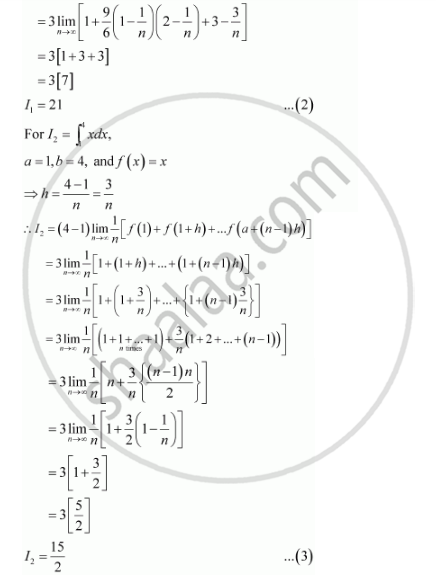Advertisements
Advertisements
प्रश्न
Evaluate the following definite integrals as limit of sums.
`int_1^4 (x^2 - x) dx`
उत्तर


From equations (2) and (3), we obtain

APPEARS IN
संबंधित प्रश्न
Evaluate `int_1^3(e^(2-3x)+x^2+1)dx` as a limit of sum.
Evaluate the following definite integrals as limit of sums.
`int_a^b x dx`
Evaluate the following definite integrals as limit of sums.
`int_0^4 (x + e^(2x)) dx`
Evaluate the definite integral:
`int_0^(pi/4) (sinx cos x)/(cos^4 x + sin^4 x)`dx
Evaluate the definite integral:
`int_0^1 dx/(sqrt(1+x) - sqrtx)`
Evaluate the definite integral:
`int_0^(pi/2) sin 2x tan^(-1) (sinx) dx`
Prove the following:
`int_0^1 xe^x dx = 1`
Prove the following:
`int_0^(pi/2) sin^3 xdx = 2/3`
Prove the following:
`int_0^1sin^(-1) xdx = pi/2 - 1`
Evaluate `int_0^1 e^(2-3x) dx` as a limit of a sum.
if `int_0^k 1/(2+ 8x^2) dx = pi/16` then the value of k is ________.
(A) `1/2`
(B) `1/3`
(C) `1/4`
(D) `1/5`
Evaluate : `int_1^3 (x^2 + 3x + e^x) dx` as the limit of the sum.
\[\int\frac{1}{x} \left( \log x \right)^2 dx\]
Evaluate the following integrals as limit of sums:
Evaluate `int_1^4 ( 1+ x +e^(2x)) dx` as limit of sums.
If f and g are continuous functions in [0, 1] satisfying f(x) = f(a – x) and g(x) + g(a – x) = a, then `int_0^"a" "f"(x) * "g"(x)"d"x` is equal to ______.
Evaluate the following as limit of sum:
`int _0^2 (x^2 + 3) "d"x`
Evaluate the following as limit of sum:
`int_0^2 "e"^x "d"x`
Evaluate the following:
`int_0^2 ("d"x)/("e"^x + "e"^-x)`
Evaluate the following:
`int_0^pi x sin x cos^2x "d"x`
Evaluate the following:
`int_(pi/3)^(pi/2) sqrt(1 + cosx)/(1 - cos x)^(5/2) "d"x`
The value of `int_(-pi)^pi sin^3x cos^2x "d"x` is ______.
Left `f(x) = {{:(1",", "if x is rational number"),(0",", "if x is irrational number"):}`. The value `fof (sqrt(3))` is
What is the derivative of `f(x) = |x|` at `x` = 0?
`lim_(x -> 0) (xroot(3)(z^2 - (z - x)^2))/(root(3)(8xz - 4x^2) + root(3)(8xz))^4` is equal to
`lim_(n rightarrow ∞)1/2^n [1/sqrt(1 - 1/2^n) + 1/sqrt(1 - 2/2^n) + 1/sqrt(1 - 3/2^n) + ...... + 1/sqrt(1 - (2^n - 1)/2^n)]` is equal to ______.
